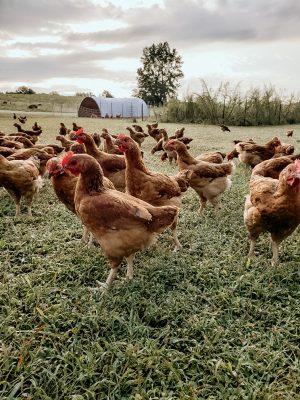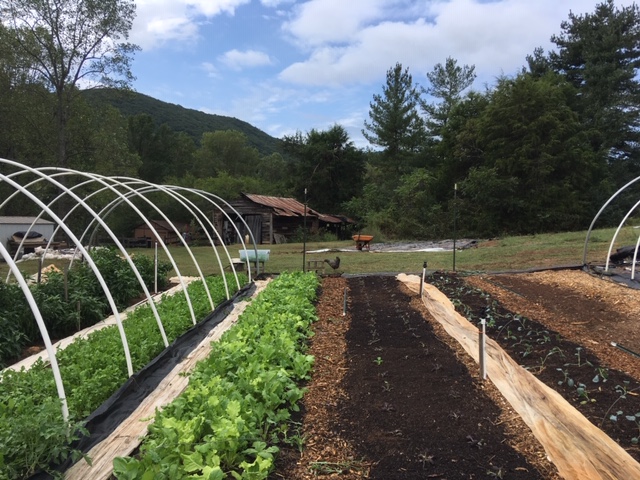Living Well Farmers Market offers tips on how to incorporate local, organic foods into your diet.
By: Nora Lea | Photos by Neah Maxwell
Why should I eat local? Why should I eat organic? Is it really better for me? Why is it more expensive? These are just a few questions I get asked as market manager at Living Well Farmers Market. For most of us the reason to eat organically is simple — foods grown without synthetic chemicals, antibiotics or steroids are just better for us and our families, especially children. I am one of many Americans touched by cancer in my family due to the powerful herbicide Agent Orange. Because of this, since I was young, I’ve been cautious of chemical exposure. However, it wasn’t until I was pregnant that I really researched about pesticide/ herbicide exposure on children. For myself, this is what started my journey to seek out local, organically grown foods. I was fortunate enough to surround myself with like-minded friends and meet local farmers.
 There’s something special about knowing where your food comes from, who grew it, and how it was raised. By buying local, you are building relationships and personal connections with farmers and your community and bolstering your local economy. You get to understand the pride that comes from what the farmers produce and the difficulties of raising food and growing crops the right way. These farmers do not use synthetic pesticides, fertilizers, GMO feed, or crowded cages. Many farmers who choose to grow organically have themselves experienced health issues related to conventional farming and realize there’s a better, safer, and healthier way to farm. They want to make a difference for future generations. Eating organic is healthier for all of us but especially for our children. Young children, especially infants, are particularly susceptible to damage due to pesticides because of their low body weights in comparison to adults or older children. There are current studies researching women’s exposure to pesticides during pregnancy. Evidence shows that pesticides may negatively impact their children’s IQ and neurobehavioral development, including ADHD. Eating locally and organically is also better for the environment. There is reduced energy consumption, air pollution, and transportation cost since products are grown closer to consumers. There are also less pesticides and herbicides in the soil that affect our water supply, land, and bodies. Buying conventional food from local farmers does not change the toxic effects that the conventional agriculture has on our environment.
There’s something special about knowing where your food comes from, who grew it, and how it was raised. By buying local, you are building relationships and personal connections with farmers and your community and bolstering your local economy. You get to understand the pride that comes from what the farmers produce and the difficulties of raising food and growing crops the right way. These farmers do not use synthetic pesticides, fertilizers, GMO feed, or crowded cages. Many farmers who choose to grow organically have themselves experienced health issues related to conventional farming and realize there’s a better, safer, and healthier way to farm. They want to make a difference for future generations. Eating organic is healthier for all of us but especially for our children. Young children, especially infants, are particularly susceptible to damage due to pesticides because of their low body weights in comparison to adults or older children. There are current studies researching women’s exposure to pesticides during pregnancy. Evidence shows that pesticides may negatively impact their children’s IQ and neurobehavioral development, including ADHD. Eating locally and organically is also better for the environment. There is reduced energy consumption, air pollution, and transportation cost since products are grown closer to consumers. There are also less pesticides and herbicides in the soil that affect our water supply, land, and bodies. Buying conventional food from local farmers does not change the toxic effects that the conventional agriculture has on our environment.
Aside from the health benefits and environmental impact, buying locally definitely benefits our local economy. Based on a study from UGA’s Agricultural and Environmental Sciences Center, if Georgians spent just $10 per week on items from local farms, it would add about $1.9 billion back into our state economy. Money spent locally stays local. By supporting local farms, you directly impact our local economy instead of paying a corporation in another city, state, or country. Also, because the food itself moves through less hands, more money ends up in the pockets of the farmers.
3 Ways to Incorporate Local and Organic Foods in Your Diet
Eating locally and organically can be a little more expensive mainly because the food that comes from smaller farms is more labor intensive since they do not use synthetic pesticides, fertilizers, or steroids.
1. Purchase local, grass-fed meats raised on pesticide- free pastures.
If fed supplemental feed, make sure your meat contains no GMOs (Genetically Modified Organisms) or is genetically engineered. Pastured animals have more space to move and have access to the outdoors and their natural environment. Beware of meats in the grocery stores; many commercial meat processers “plump” chicken, beef, and other meats by injecting it with water, salt solutions, or other additives. So, essentially, you might pay more than you think for commercially raised meats.
2. Buy organically grown produce in season.
Foods grown during their appropriate growing season are more nutrient dense. Many fruits and vegetables grown commercially year-round have a ripening agent applied — such as chemicals, heat, gases, or film — to protect it. A Georgia vine-ripened tomato organically grown in the spring and summer tastes much better than a pale tomato from California at the grocery store in winter. The flavor of in-season produce is much fresher and richer.
3. Choose local, pasture-raised eggs.
Eggs are a great source of protein and are an easy and relatively inexpensive way to incorporate local food into your diet. It’s best to ask the farmer how their hens are raised and what kind of supplemental feed is given, if any. Studies have shown that pastured hens that forage naturally have significantly more vitamin E in their eggs — about 200% more than in that of caged hens. There’s also a color difference between the two yolks showing that pastured hens have access to grass while commercial hens don’t.
Living Well Farmers Market opens early in 2020 at Solis Suwanee Town Center. Check out their website at LivingWellGA.com for more details. Also, visit Suwanee Farmers Market – Winter Farmers Market which is active October 2019 through April 2020 on the second Saturday of each month from 9-11 a.m.

















